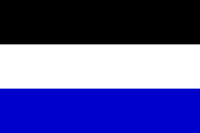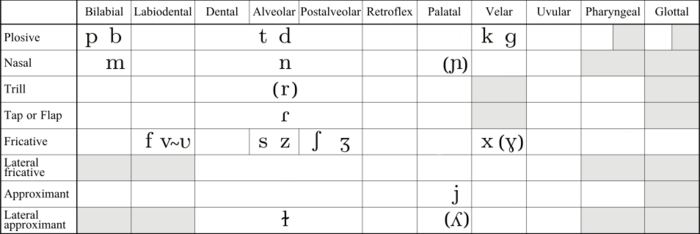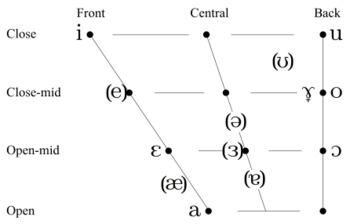Karaalani language: Difference between revisions
Admiral S.S. (talk | contribs) No edit summary |
Admiral S.S. (talk | contribs) |
||
| Line 362: | Line 362: | ||
! colspan="5"|Singular | ! colspan="5"|Singular | ||
! colspan="5"|Plural | ! colspan="5"|Plural | ||
|- | |- | ||
| bgcolor=#EAECF0|'''[https://en.wikipedia.org/wiki/Nominative_case Nom.] | | bgcolor=#EAECF0|'''[https://en.wikipedia.org/wiki/Nominative_case Nom.] | ||
| Line 374: | Line 373: | ||
| bgcolor=#EAECF0|'''[https://en.wikipedia.org/wiki/Locative_case Loc.] | | bgcolor=#EAECF0|'''[https://en.wikipedia.org/wiki/Locative_case Loc.] | ||
| bgcolor=#EAECF0|'''[https://en.wikipedia.org/wiki/Vocative_case Voc.] | | bgcolor=#EAECF0|'''[https://en.wikipedia.org/wiki/Vocative_case Voc.] | ||
|- | |||
! style="align: center; background: #A3B6BF;" colspan="4" | Masculine | |||
|- | |- | ||
| bgcolor=#EAECF0|'''Man''' | | bgcolor=#EAECF0|'''Man''' | ||
| Line 386: | Line 387: | ||
| ''Мъжде'' | | ''Мъжде'' | ||
| ''Mъже!'' | | ''Mъже!'' | ||
|- | |- | ||
| bgcolor=#EAECF0|'''Leader''' | | bgcolor=#EAECF0|'''Leader''' | ||
| Line 399: | Line 399: | ||
| ''Войводе'' | | ''Войводе'' | ||
| ''Войводе!'' | | ''Войводе!'' | ||
|- | |||
! style="align: center; background: #A3B6BF;" colspan="4" | Feminine | |||
|- | |- | ||
| bgcolor=#EAECF0|'''Church''' | | bgcolor=#EAECF0|'''Church''' | ||
| Line 411: | Line 413: | ||
| ''Църквѥй'' | | ''Църквѥй'' | ||
| ''Църкве!'' | | ''Църкве!'' | ||
|- | |- | ||
| bgcolor=#EAECF0|'''Woman''' | | bgcolor=#EAECF0|'''Woman''' | ||
| Line 424: | Line 425: | ||
| ''Женѥй'' | | ''Женѥй'' | ||
| ''Жени!'' | | ''Жени!'' | ||
|- | |||
! style="align: center; background: #A3B6BF;" colspan="4" | Neuter | |||
|- | |- | ||
| bgcolor=#EAECF0|'''Sea''' | | bgcolor=#EAECF0|'''Sea''' | ||
| Line 436: | Line 439: | ||
| ''Морѥ'' | | ''Морѥ'' | ||
| ''Moрeтá!'' | | ''Moрeтá!'' | ||
|- | |- | ||
| bgcolor=#EAECF0|'''Place''' | | bgcolor=#EAECF0|'''Place''' | ||
Revision as of 00:19, 27 December 2020
This article is incomplete because it is pending further input from participants, or it is a work-in-progress by one author. Please comment on this article's talk page to share your input, comments and questions. Note: To contribute to this article, you may need to seek help from the author(s) of this page. |
| Karaalani language | |
|---|---|
| Karaalan, Karaalanish | |
| Караалански Ѣзик Ⲕⲁⲣⲁⲁⲗⲁⲛⲥⲕⲏ Ⳉⲍⲏⲕ Karaalanski Ýzik | |
 Karaalan region flag | |
| Pronunciation | /kaɾaˈaɫan.skɪ jɜ.zik/ |
| Native to | └→ |
| Region | Slavic Belt in Thuadia |
| Ethnicity | Karaalani Slavs |
Native speakers | L1: - L2: - FL: - |
Sivuk-Slavogermanic
| |
Standard forms | Eastern Karaalani Dialect
|
| Dialects |
|
| Variant of the Old Govoric alphabet Protopolyash script | |
| Official status | |
Official language in | └→ |
Recognised minority language in | |
| Language codes | |
| ISO 639-1 | KR |
| ISO 639-2 | KRA |
| ISO 639-3 | KRA |
Karaalani language is a Slavic language out of Kento-Polyash language group, which is a (co-)official language of the Karaalan region of Monte Blanco, Mustelaria.
Introduction
The Language has slavic root and grammar, and has 5 cases. Karaalani is slightly influenced by its bordering languages, like the Belgorian dialects, but it has managed to stay to its roots, quriosly it has words that sound very similar to words in the Kentalian langauge of ![]() Kentalis.
Kentalis.
Writing System
Karaalani has two official scripts (Both Alphabets), an adapted version of the Protopolyash script used in the Belgorian language, and the prefered Karaalani variant of the Old Govoric alphabet (commonly reffered to as the Iraklic script after the Karaalani who standerdised it), which drops certain nasal letters, but keeps others. Some people preffer to use a modified latin alphabet too, which has also been standerdised.
| Numeric vallue |
Iraklic version | Adapted Protopolyash version |
Latin version | IPA Symbol |
|---|---|---|---|---|
| 1 | А а | Ⲁ ⲁ | A a | /а~ɑ/ |
| 2 | Б б | Ⲃⲃ ⲃⲃ | B b | /b/ |
| 3 | В в | Ⲃ ⲃ | V v | /v~ʋ/ |
| 4 | Г г | Ⲅ ⲅ | G g | /g/ |
| 5 | Д д | Ⲇ ⲇ | D d | /d/ |
| 6 | Е е | Ⲉ ⲉ | E e | /ɛ~e/ |
| 7 | Ж ж | Ϧ ϧ | Ž ž | /ʒ/ |
| 8 | З з | Ⲍ ⲍ | Z z | /z/ |
| 9 | И и | Ⲏ ⲏ | I i | /i/ |
| 10 | Й й | Ⲓ ⲓ | Y y | /j/ |
| 20 | К к | Ⲕ ⲕ | K k | /k/ |
| 30 | Л л | Ⲗ ⲗ | L l | /ɫ/ |
| 40 | М м | Ⲙ ⲙ | M m | /m/ |
| 50 | Н н | Ⲛ ⲛ | N n | /n/ |
| 100 | О о | Ⲟ ⲟ | O o | /ɔ/ |
| 200 | Ѡ ѡ/ω | Ⲱ ⲱ | Ó ó | /o/ |
| 300 | П п | Ⲡ ⲡ | P p | /p/ |
| 400 | Р р | Ⲣ ⲣ | R r | /ɾ~r/ |
| 500 | С с | Ⲥ ⲥ | S s | /s/ |
| 1,000 | Т т | Ⲧ ⲧ | T t | /t/ |
| 2,000 | У у | Ⲩ ⲩ | U u | /u/ |
| 3,000 | Ф ф | Ⲫ ⲫ | F f | /f/ |
| 4,000 | Х х | Ⲭ ⲭ | H h | /x/ |
| 5,000 | Ц ц | Ϯ ϯ | C c (Ts ts) |
/t͡s/ |
| 10,000 | Ԃ ԃ | Ⳁ ⳁ | Dz dz | /d͡z/ |
| 20,000 | Ч ч | Ϫ ϫ | Č č | /t͡ʃ/ |
| 30,000 | Ҷ ҷ | Ϥ ϥ | Ď đ | /d͡ʒ/ |
| 40,000 | Ш ш | Ⲋ ⲋ | Š š | /ʃ/ |
| 50,000 | Щ щ | Ϣ ϣ | Št št | /ʃt/ |
| 100,000 | Ъ ъ | Ϩ ϩ | Ă ă | /ɤ̞~ɤ~ə/ |
| 200,000 | Ѣ ѣ | Ⳉ ⳉ | Ý ý | /jæ~jɜ/ /ɛ-e/ in Western & Southern dialects |
| 300,000 | Ь ь | Ϭ ϭ | Y y | /◌ʲ/ |
| 400,000 | Ю ю | Ⲓⲩ ⲓⲩ | Yu yu | /ju/ |
| 500,000 | Я я | Ⲓⲁ ⲓⲁ | Ya ya | /ja/ |
| 1,000,000 | Ꙗ ꙗ | Ⲏⲁ ⲏⲁ | Ia ia | /ɪa~ɪja/ |
| 2,000,000 | Ѥ ѥ | Ⲓⲉ ⲓⲉ | Ye ye | /je/ |
| 3,000,000 | Ѫ ѫ | Ⲓⲱ ⲓⲱ | Yó yó | /jɔ~jo/ |
| 4,000,000 | Ѯ ѯ | Ⲝ ⲝ | X x (Ks ks) |
/ks/ |
| 5,000,000 | Ѱ ѱ | Ⲯ ⲯ | Ps ps | /ps/ |
- а̀ varia (grave accent), indicating stress on the last syllable (U+0300)
- а́ oksia (acute accent), indicating a stressed syllable (U+0301)
- а҃ titlo, indicating abbreviations, or letters used as numerals (U+0483)
The old way to write numerals works by adding letters up, for example 115 would be spelled with the corespouding letters for the numerals 100-10-5 with a titlo on top.
Phonology
.
Nouns
Grammatical Gender
Karaalani has 3 grammatical genders
- Masculine - all masculine nouns end in a consonant sound
- Feminine - all feminine nouns end in /a/
- Neuter - all neuter nouns end in /o/ or /ɛ/
Grammatical Cases
Karaalani has 5 grammatical cases.
- Nominative: Subject or a Predicate noun or adjectiv
- Dative: Giving to Subject
- Accusative: Interract with Subject (hear, hit, harm...)
- Locative: In Subject, on Subject
- Vocative: Referring to Subject, calling Subject
| Translation to Common | Singular | Plural | ||||||||
|---|---|---|---|---|---|---|---|---|---|---|
| Nom. | Dat. | Acc. | Loc. | Voc. | Nom. | Dat. | Acc. | Loc. | Voc. | |
| Masculine | ||||||||||
| Man | Mъж Ⲙϩϧ Măž |
Мъжу | Mъжом | Mъждо | Mъжо! | Mъже | Muзеу | Mъжем | Мъжде | Mъже! |
| Leader | Войвод | Войводу | Войводом | Войводо | Войводе! | Войводи | Войводеу | Войводем | Войводе | Войводе! |
| Feminine | ||||||||||
| Church | Църква | Църкву | Църквом | Църквѥ | Църкво! | Църкви | Църквеу | Църквѥм | Църквѥй | Църкве! |
| Woman | Жена | Жену | Женом | Женѥ | Жено! | Жени | Женеу | Женѥм | Женѥй | Жени! |
| Neuter | ||||||||||
| Sea | Moре | Moро | Мором | Морю | Moрé! | Moреta | Moрѣ | Морѣм | Морѥ | Moрeтá! |
| Place | Мѣсто | Мѣсту | Мѣстом | Мѣстю | Мѣстé! | Мѣста | Мѣстѣ | Мѣстѣм | Мѣстѥ | Мѣстетá! |

